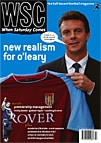 John Chapman explains why the Belgian FA is making it tough for clubs
John Chapman explains why the Belgian FA is making it tough for clubs
In a country with 18 political parties and three official languages, it’s no surprise the Belgian FA has labyrinthine regulations. Euro 2000 supremo and ex-FA official Alain Courtois once commented: “They’re so complicated, I’m totally lost.” Recently, those same regulations have swung into action as economic realism hit Belgian football with a vengeance.
Since 2000, clubs in the top two divisions have had to apply to the Commission des Licences for a permit. To receive one, clubs have to show that they have no debts relating to taxes, social security, salaries and players’ insurance. In the first season, no one was refused a licence, but since then the Commission has been biting. Last season, RWD Molenbeek called in the receivers after making promises that a cheque was winging its way from Eastern Europe. When it didn’t arrive, Brussels lost one of its two first division clubs.
This season, Mechelen racked up debts of £15 million by the mid-winter break. With no hope of receiving their wages, the players left, as did first-team coach Stefan Demol. Although no one could understand how they had ever been granted a licence, there was an immediate show of support, most notably from Michel Preud’homme’s Standard Liège. Preud’homme – in the squad that won the 1988 European Cup-Winners Cup – crated up five youngsters and sent them off to Mechelen to gain experience. With support from the media and the ubiquitous Jean-Marie Pfaff, the club struggled on to season’s end.
Not so Lommel. The rule book says debts to the FA must be paid on the nail. Found to owe some £4,000, there was a high risk that the debt-stricken club would be forced out of the league in mid-season. The mighty Anderlecht, who had taken six points from the Limbourgers, were thrown into panic. Shamelessly, they offered to pay the debt, as those points could have been the difference between a Champions League spot or – for the second season running – the humble UEFA Cup.
The FA refused Anderlecht’s kind offer and no one else came forward. With Lommel heading for meltdown, all the first-team squad left for slightly sunnier climes. The club struggled on with teenagers. Sometimes they played; sometimes they forfeited the game 5-0. Luckily for the FA, Anderlecht started winning matches and easily qualified for the second Champions League berth. As Les Mauves no longer needed Lommel’s points, the FA came down hard and expelled the club immediately, with all clubs losing any points gained against Lommel. Bad day in Lommel.
That’s not all. A reconstituted Mechelen will resurface in the third division and, with Lommel’s recent demise, no one else will be relegated from the Jupiler League. In the second division, FC Liège have also been refused a professional licence and will, pend-ing an appeal, join Mechelen.
So far, so straightforward. In the lower leagues, life is more complicated. Third division champions Berchem have also been refused a licence so stay down. Because FC Liège have been demoted to the third division, the second division’s bottom club Maasmechelen will not be relegated. Despite that, they turned out in the third division play-offs, watched by relatives and friends. Finally, because Berchem have no licence, third division runners-up Ostend will take their place, despite having lost in those same play-offs…
As we went to press, Charleroi, who owe money to everyone, including £400,000 to Enzo Scifo, have just been reprieved. However, with assets of £2m and losses of £3m, the result could be misery. Next on the horizon is the potential downfall of La Louvière. With a (remarkably) poor ground, a weak team, little support and no politicians willing to push the envelope, prospects are bleak for Les Loups. Geographically between Charleroi and Mons, a merger with one of them looks certain.
So the Jupiler League could start next season with only 17 clubs. That’s still three too many for the big boys, and there’s none bigger than Anderlecht, who would like their own Belgian Premier League. For season 2003-04, clubs will have to conform to the much stricter UEFA licensing rules. Whose idea was that?
From WSC 197 July 2003. What was happening this month